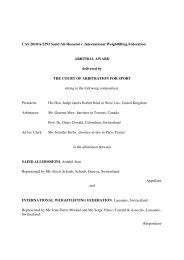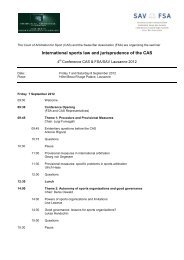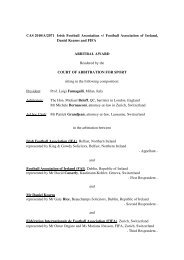(CAS) Bulletin - Tribunal Arbitral du Sport / TAS
(CAS) Bulletin - Tribunal Arbitral du Sport / TAS
(CAS) Bulletin - Tribunal Arbitral du Sport / TAS
You also want an ePaper? Increase the reach of your titles
YUMPU automatically turns print PDFs into web optimized ePapers that Google loves.
which will be addressed in detail below - although<br />
the use of clenbuterol in Spain was prohibited in<br />
livestock farming prior to such implementation,<br />
it was sanctioned only through the imposition of<br />
administrative sanctions (i.e. a fi ne) and not at a<br />
criminal level through, for example, imprisonment; d)<br />
Lucio Carabias has also been subjected to a number of<br />
controls without a positive case of clenbuterol or any<br />
other beta-agonist. In particular, six random samples<br />
of his animals were taken by the veterinarians of the<br />
Felipe Rebollo slaughterhouse throughout 2009 and<br />
2010.<br />
In addition to WADA’s arguments, the UCI puts<br />
forward that the circumstance that the brother of the<br />
farmer who supplied the animal was fi ned is of no<br />
avail because if any association with the brother of<br />
Mr Lucio Carabias Muñoz were to be made, it would<br />
have led to targeted and more frequent controls and<br />
this was not the case.<br />
Mr Contador submitted that the animal in question<br />
could also have come from a different supplier.<br />
According to the Report revealed by Castellana<br />
Detectives, the origin of the meat is not certain and<br />
could in fact even have been supplied by another<br />
supplier. The uncertainty of the precise origin of the<br />
meat means that if it was not the pro<strong>du</strong>ct of an animal<br />
reared in Spain, there also exists the possibility that it<br />
could have been the pro<strong>du</strong>ct of a cow reared in South<br />
America. This uncertainty means that it is impossible<br />
to know for certain what controls were in place at the<br />
location of the animal’s location of origin.<br />
However, whether the meat came specifi cally from Mr<br />
Lucio Carabias Muñoz, or from an unknown location<br />
in Spain, or even South America, it remains that the<br />
risk that the animal from which the meat came was<br />
treated with clenbuterol is not only conceivable but<br />
is likely, fi rst, because there is clenbuterol in the<br />
Athlete’s system, second because the clenbuterol<br />
cannot plausibly have come from any other source,<br />
and third because of the history of clenbuterol abuse<br />
in each of the potential sources.<br />
Even assuming the Appellants had con<strong>du</strong>cted the<br />
necessary degree of investigation to confi dently come<br />
to such a conclusion, they presume that because<br />
there is no history with clenbuterol, the meat is<br />
unlikely to have been contaminated. According to<br />
Mr Contador, that is a surprising conclusion of the<br />
Appellants; in order to try and demonstrate their<br />
allegation, the counsels for Mr Contador asked the<br />
following question and invited the Panel to consider<br />
it by analogy: Would the Appellants conclude that<br />
an athlete did not dope or had been the victim of<br />
food supplements contamination on the basis that he<br />
passed 500 doping control tests before failing one?<br />
They do not.<br />
The Athlete argues that the Appellants cannot<br />
plausibly suggest, as they appear to, that it is suffi cient<br />
to ask those involved in the supply chain whether they<br />
have had any problems with clenbuterol to conclude<br />
that the meat is unlikely to have been contaminated.<br />
It is surprising that the Appellants would consider<br />
such a level of proof suffi cient to come to such a<br />
conclusion. In any event, it is unlikely that a butcher<br />
or its distributors would know that meat handled by<br />
them had been contaminated with clenbuterol. A<br />
more appropriate approach by Winterman Detectives<br />
would have been to enquire as to the number of<br />
meat samples collected from the butcher and meat<br />
supplier which had been analysed for the presence of<br />
clenbuterol. However, no evidence is advanced that<br />
such spot checks for the presence of clenbuterol have<br />
ever taken place.<br />
Mr Contador submits that given that the precise source<br />
of the meat remains unresolved, it cannot defi nitely<br />
be traced back to the Felipe Rebollo slaughterhouse,<br />
Lucio Carabias Muñoz or even necessarily to being<br />
Spanish meat. The alternative is that it came from a<br />
different meat distributor, a different slaughterhouse,<br />
a different farm and a different country in respect of<br />
which there is no information as to what controls, if<br />
any, were in place at the point of origin.<br />
Mr Contador further submits that of course,<br />
any discussions in relation to the supply chain<br />
are irrelevant if the animal from which the meat<br />
originated was one of the 99.98% animals not tested<br />
in Spain in 2010. Moreover, Mr Contador asserts that<br />
the animal identifi ed by the Traceability Report and<br />
the Appellants as the one most likely to have been the<br />
source of the meat did not undergo any testing before<br />
or after slaughter.<br />
According to Mr Contador, the fact that Mr Domingo<br />
Carabias, the brother of Mr Lucio Carabias Muñoz<br />
and formerly joint director, had in fact previously been<br />
sanctioned for the illegal use of clenbuterol to fatten<br />
cattle is of utmost importance. Taken against a context<br />
in which the Athlete ate the meat and then tested<br />
positive for clenbuterol, this could mean one of two<br />
things: 1) the meat did indeed come from an animal<br />
reared by Mr Carabias Muñoz that was treated with<br />
clenbuterol; or 2) if it did not, the fact of the Carabias<br />
Muñoz family’s previous history with clenbuterol<br />
abuse is not just an astonishing coincidence, but is<br />
in fact an indicator of the prevalence of clenbuterol<br />
abuse in the Spanish farming in<strong>du</strong>stry.<br />
Jurisprudence majeure / Leading cases<br />
-<br />
120





